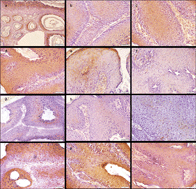A low toxic synthetic dendrimer conjugated podophyllotoxin nanodevice with potent antitumor activity against the DMBA/TPA induced mouse skin carcinogenesis model†‡
Abstract
Natural podophyllotoxin (PODO) is an anticancer drug that functions as an anti-mitotic agent and inhibits tubulin polymerization. However, high toxicity and low bioavailability limit its anticancer applications. To minimize toxicity and enhance solubility under physiological conditions, we conjugated PODO to a poly(amidoamine) (PAMAM) dendrimer to generate sustained-release nanodevices (D-PODO). Free PODO and its dendrimer conjugates were screened for toxicity in Swiss albino mice, and the dose-dependent antitumor activity of D-PODO was evaluated in a two-stage mouse skin carcinogenesis model. The results showed that 8 mg kg−1 D-PODO was nontoxic, whereas the same dose of PODO was highly toxic, as indicated by mortality, biochemical and histopathological studies. An antitumor therapeutic study using D-PODO in tumor-bearing mice revealed a 50–60% inhibition of skin tumor formation. Histopathology and immunohistochemistry studies revealed that D-PODO treatment reduced epithelial hyperplasia, and induced apoptosis by increasing the Bax to Bcl-2 ratio and reducing NF-κB expression. Importantly, the D-PODO conjugate was less toxic than PODO, and inhibited skin tumor progression effectively.


 Please wait while we load your content...
Please wait while we load your content...